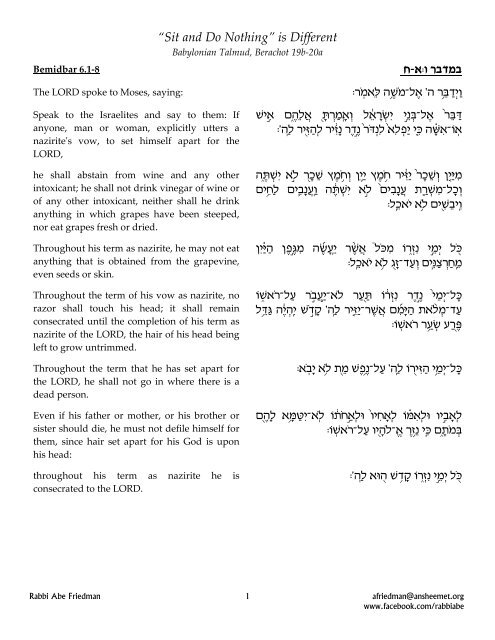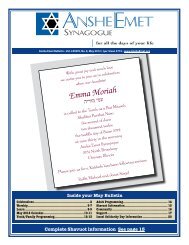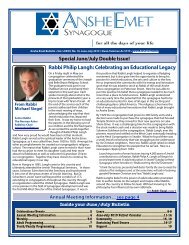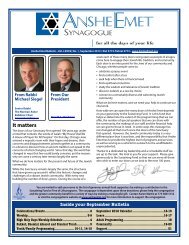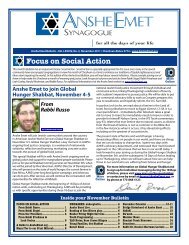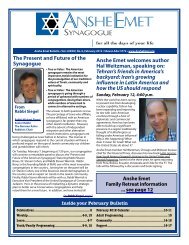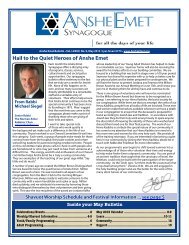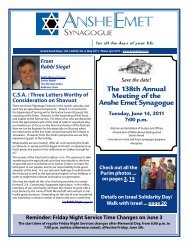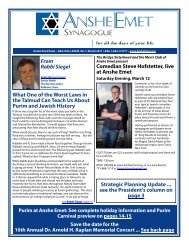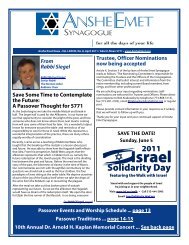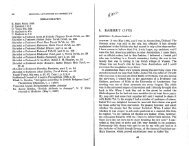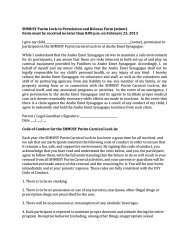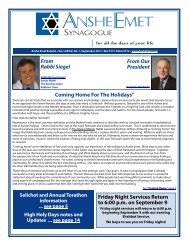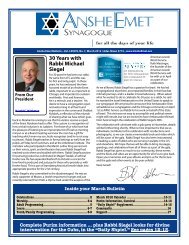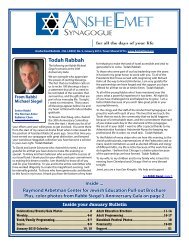(20a) Shev ve-al ta'aseh - Anshe Emet Synagogue
(20a) Shev ve-al ta'aseh - Anshe Emet Synagogue
(20a) Shev ve-al ta'aseh - Anshe Emet Synagogue
Create successful ePaper yourself
Turn your PDF publications into a flip-book with our unique Google optimized e-Paper software.
“Sit and Do Nothing” is Different<br />
Babylonian T<strong>al</strong>mud, Berachot 19b-<strong>20a</strong><br />
Bemidbar 6.1-8 j-t:u rcsnc<br />
The LORD spoke to Moses, saying:<br />
Speak to the Israelites and say to them: If<br />
anyone, man or woman, explicitly utters a<br />
nazirite's vow, to set himself apart for the<br />
LORD,<br />
he sh<strong>al</strong>l abstain from wine and any other<br />
intoxicant; he sh<strong>al</strong>l not drink vinegar of wine or<br />
of any other intoxicant, neither sh<strong>al</strong>l he drink<br />
anything in which grapes ha<strong>ve</strong> been steeped,<br />
nor eat grapes fresh or dried.<br />
Throughout his term as nazirite, he may not eat<br />
anything that is obtained from the grapevine,<br />
e<strong>ve</strong>n seeds or skin.<br />
Throughout the term of his vow as nazirite, no<br />
razor sh<strong>al</strong>l touch his head; it sh<strong>al</strong>l remain<br />
consecrated until the completion of his term as<br />
nazirite of the LORD, the hair of his head being<br />
left to grow untrimmed.<br />
Throughout the term that he has set apart for<br />
the LORD, he sh<strong>al</strong>l not go in where there is a<br />
dead person.<br />
E<strong>ve</strong>n if his father or mother, or his brother or<br />
sister should die, he must not defile himself for<br />
them, since hair set apart for his God is upon<br />
his head:<br />
throughout his term as nazirite he is<br />
consecrated to the LORD.<br />
:r« ntK v¬J«nk t wv r¬C shu<br />
Jh´t o·vkt T r<br />
nt u k ºt r<br />
Gh h´b Ck t ÆrC S<br />
:wvk rhZ vk rhºzb rs´b Ær«Sbk Ætk ph h³F v À tI t<br />
v·T Jh t´«k rf J . n«¬j u ih²h . n«¬j rhºZh Ærf J u ih³H n<br />
oh¬jk oh²cbgu v ºT Jh t´«k Æoh cbg ,³ r J nkf u<br />
:kft«h t¬«k ohJchu<br />
ihÀH v ip´D n v ¹Ggh r¸Jt Ák«F n I r·<br />
zb h´nh k«F<br />
:kft«h t¬«k dzs g u oh²B m r<br />
jn<br />
I ·Jt«rk g r«ćght«k r gT I ºr zb rs´b Æh nhkF<br />
k¬SD vºh vh J«ś e wvk rh³Zhr Jt o ¹nH v ,t¸ «k ns g<br />
:I Jt«r r¬ g G g rP<br />
:t«ch t¬«k ,n Jp¬bk g wvk Irh Z v h¬nhkF<br />
ovk t¬N Yht «k I º,«j´tkU Æuh j tk I ÀN tkU uh´c tk<br />
:I Jt«rk g uhv«kt rz¬b h²F o·,«n C<br />
:wvk tU v J ¬s e I r·<br />
zb h´nh k«F<br />
Rabbi Abe Friedman 1 afriedman@ansheemet.org<br />
www.facebook.com/rabbiabe
Rashi, Berachot 19b<br />
France, 1040-1105<br />
Or for his sister. What does this teach us? -<br />
Regarding a Nazir it is written, The whole time of<br />
his dedication to Hashem, he sh<strong>al</strong>l not go near a dead<br />
person, and immediately following it is for his<br />
father, or for his mother, for his brother, or for his<br />
sister -- he may not become impure - <strong>al</strong>l of which<br />
were included in the gener<strong>al</strong> rule, he sh<strong>al</strong>l not go<br />
near a dead person!<br />
So why were they specified? For his father [he is<br />
prohibited from becoming impure] - but not for<br />
a Mitzvah Corpse.<br />
And for his mother. What does this teach us? It<br />
is not needed for a Mitzvah Corpse, as that is<br />
deri<strong>ve</strong>d from for his father. And they explained<br />
it in Sifrei: To teach that if this Nazir was [<strong>al</strong>so]<br />
a Kohen, and thus had two instances of<br />
holiness, he <strong>al</strong>so may not become impure for<br />
his mother, but he should become impure for a<br />
Mitzvah Corpse. [N.B.: Although Rashi cites<br />
Sifrei, this midrash actu<strong>al</strong>ly appears in Bemidbar<br />
Rabbah (Vilna ed.) 10.11 -ASF]<br />
And for his brother. What does this teach us? If<br />
he was the Kohen Gadol [who can not become<br />
impure e<strong>ve</strong>n for a relati<strong>ve</strong>] and <strong>al</strong>so a Nazir, he<br />
<strong>al</strong>so may not become impure for his brother,<br />
but he should become impure for a Mitzvah<br />
Corpse<br />
And for his sister. What does this teach us? If it<br />
is not on this subject, teach about one who was<br />
going to slaughter his Pesach sacrifice and<br />
circumcise his son - that he should become<br />
impure for a Mitzvah Corpse.<br />
“Sit and Do Nothing” is Different<br />
Babylonian T<strong>al</strong>mud, Berachot 19b-<strong>20a</strong><br />
c sung yh ;s ,ufrc ,fxn h"ar<br />
- rnuk sunk, vn u,ujtku<br />
ch,f rhzbc<br />
lhnxu 'tch tk ,n apb kg wvk urhzv hnh kf<br />
tnyh tk u,ujtku uhjtk untku uhctk vhk<br />
/uhv tch tk ,n apb kg kkfc uvkuf tvs ovk<br />
/vumn ,nk yrp - uhctk ?utmh vnku<br />
tk vumn ,n ouan 'rnuk sunk, vn untk<br />
hrpxc vhk harsu /tepb uhctkns 'lhrymht<br />
h,a vhkg uuvs 'ivf vz rhzb vhv ota sunkk<br />
kct 'tnyh tks tuv untk 'tuv ;t ,uause<br />
/vumn ,nk tuv tnyn<br />
kusd ivf vhva hrv 'rnuk sunk, vn uhjtk<br />
kct 'tnyh tk uhjtk tuv ;t 'rhzb tuvu<br />
/vumn ,nk tnyn<br />
'vzk ihbg ubht ot 'rnuk sunk, vn u,ujtku<br />
kunku ujxp ,t yujak lkuva hnk ihbg uvb,<br />
/vumn ,nk tnyna - ubc ,t<br />
Rabbi Abe Friedman 2 afriedman@ansheemet.org<br />
www.facebook.com/rabbiabe
And he heard that a near relati<strong>ve</strong> of his had<br />
died - Could he become impure for them?<br />
You say that he should not become impure. -<br />
Since it is time for slaughtering the Pesach<br />
sacrifice - and the obligation of the Pesach is<br />
upon him, which incurs karet [if one fails to<br />
offer it] - if he becomes impure he will be<br />
pre<strong>ve</strong>nted from offering the Pesach; and to<br />
circumcise his son is <strong>al</strong>so a commandment that<br />
incurs karet. And some say that this is <strong>al</strong>l<br />
stated about the E<strong>ve</strong> of Pesach, when<br />
circumcising his son pre<strong>ve</strong>nts the Pesach.<br />
“Sit and Do Nothing” is Different<br />
Babylonian T<strong>al</strong>mud, Berachot 19b-<strong>20a</strong><br />
tnyh kufh 'uhcuren<br />
- ,n uk ,na gnau<br />
/ovk<br />
- tnyh tk ,rnt<br />
,yhja ,bugu khtuv<br />
tuva jxpv ,cuj uhkg vkju - thv jxpv<br />
kunku 'jxp ,uagkn kyc tnyh ot - ,rfc<br />
hcrgc hrnts ,htu 'thv ,rf ,umn hnb ubc ,t<br />
/jxpv cfgn uhrfz ,khns 'rnte hnb ohjxp<br />
N.B.: Although one does not need to be ritu<strong>al</strong>ly pure to circumcise a son,<br />
presumably if the man stops to bury his relati<strong>ve</strong> on the E<strong>ve</strong> of Pesach he<br />
will not ha<strong>ve</strong> time to both circumcise his son and offer the Pesach.<br />
According to the Torah, if any member of his household remained<br />
uncircumcised when Pesach began, he would be restricted from<br />
participating in the Pesach sacrifice, and thus incur karet. Consequently,<br />
if he stops to bury the relati<strong>ve</strong> and then circumcises his son, he will not<br />
ha<strong>ve</strong> time to offer the Pesach sacrifice; but if he skips the circumcision, he<br />
will still fail to offer the sacrifice since his son remains uncircumcised.<br />
It is otherwise difficult to understand Rashi’s line of reasoning, “and to<br />
circumcise his son is <strong>al</strong>so a commandment that incurs karet,” since the<br />
failure to circumcise incurs karet for the son, if he does not circumcise<br />
himself upon reaching the age of leg<strong>al</strong> majority. Consequently, <strong>al</strong>though<br />
circumcision does invol<strong>ve</strong> karet, it is not par<strong>al</strong>lel to the earlier case of the<br />
Pesach, where the father’s exposure to karet o<strong>ve</strong>rrides the gener<strong>al</strong><br />
obligation to tend to a relati<strong>ve</strong>’s buri<strong>al</strong>. -ASF<br />
Rabbi Abe Friedman 3 afriedman@ansheemet.org<br />
www.facebook.com/rabbiabe
Rashi, Berachot <strong>20a</strong><br />
France, 1040-1105<br />
“Sit and Do Nothing” is Different<br />
Babylonian T<strong>al</strong>mud, Berachot 19b-<strong>20a</strong><br />
t sung f ;s ,ufrc ,fxn h"ar<br />
But he does become impure for a Mitzvah<br />
Corpse. - And that is human dignity, and it<br />
o<strong>ve</strong>rrides a Biblic<strong>al</strong> matter.<br />
A case of “sit and do nothing” is different. -<br />
Many things were permitted to o<strong>ve</strong>rride a<br />
Biblic<strong>al</strong> matter - because of a “fence” or because<br />
of human dignity - where the thing was not<br />
acti<strong>ve</strong>ly o<strong>ve</strong>rridden, but he sat in his place and<br />
the Torah matter was o<strong>ve</strong>rridden on its own,<br />
such as blowing the shofar and [waving] the<br />
lulav on Shabbat, and a linen garment with<br />
tzitzit, and many others like them in Yevamot<br />
(90b). But to acti<strong>ve</strong>ly o<strong>ve</strong>rride - no; and one<br />
who wears sha’atnez o<strong>ve</strong>rrides with a definite<br />
action, as he is wearing it.<br />
But the physic<strong>al</strong> impurity that they permitted<br />
so the Kohen and the Nazir could become<br />
impure for a Mitzvah Corpse, where they<br />
acti<strong>ve</strong>ly o<strong>ve</strong>rride on account of human dignity<br />
and it is not a case of “sit and do nothing,” this<br />
is the reason we do not extrapolate from it -<br />
because there [in the case of a Kohen] human<br />
dignity is not pushing aside an acti<strong>ve</strong><br />
prohibition, since from the outset when the<br />
prohibition of impurity was stated, it was not<br />
stated regarding a Mitzvah Corpse, just as it<br />
was not stated regarding relati<strong>ve</strong>s.<br />
But returning a lost object or [slaughtering] the<br />
Pesach - these apply to <strong>al</strong>l Israel, but when in<br />
conflict with human dignity they can be pushed<br />
aside; therefore you must admit that their<br />
pushing aside is not acti<strong>ve</strong>, but rather in<br />
passivity the mitzvah is pushed aside. But in a<br />
case of sha’atnez, where he acti<strong>ve</strong>ly pushes it<br />
aside - we are warned to be cautious about it.<br />
sucf tuvu - vumn ,nk tuv tnyn kct<br />
/vru, rcs vjusu ',uhrcv<br />
urh,v ohcr ohrcs - hbta vag, ktu ca<br />
sucf hbpnu dhhx hbpn vru, rcs ruegk<br />
'ohsh vagnc rcs reug ubhts tfhv ',uhrcv<br />
'uhktn regb vru, rcsu 'unuenc cauh tkt<br />
',hmhmc ihsxu ',cac ckuku rpua ,ghe, iudf<br />
kct /(wc 'wm ;s) ,unchc tcuy uvhh,uufsu<br />
ureug ohtkf acukvu 'tk - ohshc regn<br />
/uacuk tuva 'ann vagnc<br />
tnyhk rhzbku ivfk vr,uva vhpud ,tnuyu<br />
sucf hbpn ohshc regn tes 'vumn ,nk<br />
tngy ubhhv 'tuv vag, ktu ca utks ,uhrcv<br />
,uhrcv sucf utk o,vs - vhbhn ibhrnd tks<br />
c,fbaf trehgns 'vshs vag, tk hjss tuv<br />
'c,fb vumn ,n kg tk - vtnuys vag, tk<br />
/ohcurev kg c,fb tka oaf<br />
'rntb ktrah kfk - jxpu vsct ,cav kct<br />
ubhhv ljrf kg ',ujsk ub,b ,uhrcv sucf kmtu<br />
vjs, u,chahc tkt ohshc vbht i,hhjss<br />
- vjsh uhsh vagncs ohtkf kct /vumnv<br />
/u,rvztc rhvzv<br />
Rabbi Abe Friedman 4 afriedman@ansheemet.org<br />
www.facebook.com/rabbiabe


